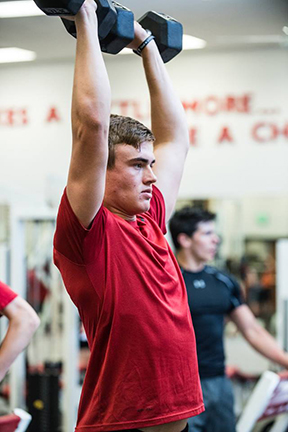 The following reprinted from our news partners at The Pilot News is the second in a series of articles looking at the subject of weight training supplements. In this week’s installment, we talked to trainers and doctors about their take on “performance enhancing” dietary supplements. Plymouth Community School Corporation is currently considering banning such substances on its campuses. Part one was published in the June 15 edition of the Pilot News.
The following reprinted from our news partners at The Pilot News is the second in a series of articles looking at the subject of weight training supplements. In this week’s installment, we talked to trainers and doctors about their take on “performance enhancing” dietary supplements. Plymouth Community School Corporation is currently considering banning such substances on its campuses. Part one was published in the June 15 edition of the Pilot News.
PLYMOUTH – Looking for an edge… Every athlete wants it and with the pressure to perform or be left behind, athletes looking for that edge are younger and younger.
Nearly every athlete takes part in weight training these days. Most schools have class periods during the day for their athletes — as well as other students to take part in organized weight training under the instruction of a teacher/coach. In the interest of making monetary gain out of that desire to be the best, an entire industry of “performance enhancing” dietary products are on the market, the variety of which are far to vast to name.
The “problem” of athletes using performance enhancing products on campus and in the weight room is becoming more widespread.
“It’s about equal with both boys and girls,” said Ryan Carroll, head trainer at Plymouth Schools. “We went in and took a look at lockers in the locker room, (fronts of lockers are caged so that items inside can be easily seen without being opened) and we had 15 lockers with one, sometimes two or three products. Not everybody is doing it, but the use is growing.”
“There isn’t nearly the usage at the junior high as there is in the high school,” said Plymouth Assistant athletic trainer Primmer Zook. “But there are some.”
Kim Richey, head athletic trainer at Ancilla College says at her level, it’s almost impossible to know exactly how many athletes are using supplements.
“They live on their own, most of them work out a lot on their own. We don’t have the kind of contact with our athletes that Ryan and Primmer do outside of actual practice and games,” she said. “As a result, we really have no way of knowing exactly how many of our athletes use supplements. We find out about when something goes wrong, or most times they come to us when they are afraid they’ve taken something that might make them fail a drug test.”
With the prevalence of usage these products have among even high school athletes, many local trainers and medical professionals have begun studying — and many times taking a stance against — some of these products. Many of them have found that not only do many products not live up to claims, just as many are actually harmful, and used in the wrong way very dangerous to the health of a young athlete.
“There are some products that are beneficial in terms of their nutritional and recovery elements for athletes,” said Plymouth Schools team physician Dr. Tod Stillson. “However a lot of this industry is unregulated, and people just pour it in and think its going to help them. We want to provide some information to our public and school for the safe use of products as well as educate on what really does work and what doesn’t work.”
“We tend to think because it’s an over-the-counter product it must be safe, it must be all good — but that isn’t true,” said Stillson. “Dietary supplements are not regulated the way drugs or other products you buy over the counter are. To give you a take on it, drugs are considered unsafe until they are proven by scientific research to be safe. Dietary products are considered safe until proven unsafe.”
Several weeks ago, Stillson – along with the athletic training staff at Plymouth – approached the athletic department and the school board about a policy that would keep such products off of school grounds.
“One thing that really concerned us is the mindset that if a little bit of something is helpful, a lot of something will be really helpful,” said Stillson. “A lot of times, not only is it not helpful, it’s harmful. We don’t have any independent clearinghouses in this country that are taking it upon themselves to study these products and find out what the evidence says.
“The studies we have show that 15 to 20 percent of these products have extra ingredients – including anabolic steroids – added to them. Some of these things are unsafe and you may not even know it because it’s not listed on the container. Why would a company do that? If it works for you, you’ll purchase it again and tell others about it. Meanwhile some of these products will bring about a positive test for banned substances.”
The main supplement trainers have issue with is “pre-workout” and energy drinks. The effect of these highly caffeinated drinks – used in large amounts – can be very dangerous to a young athlete.
“We are dead set against the pre-workout supplements,” said Carroll, “anything that raises your heart rate and your blood pressure. Those things have no place in a 15-year-old’s body. Some of the things like creatine and protein powder can be beneficial, but they can be more beneficial when you get it through your diet.”
“It’s going to get your heartbeat raised, it’s going to get your blood pressure raised. We’ve had to send kids home during the day because their heart rate gets so high and they are so jittery they can’t calm down.”
“You aren’t drinking water with it, so you are dehydrated to begin with, so your blood is thicker, your heart is pumping faster and your blood pressure goes up and that is all bad for an athlete going out to work out.”
Since they are not illegal, the substances may also be freely shared from athlete to athlete and that causes another dilemma for the trainers.
“We have no way of knowing what is in any particular shaker bottle or container and that’s not a safe thing,” said Zook. “That puts Ryan and myself in a terrible situation because if something happens in a game and the paramedics have to step in and somebody’s heart is racing and their blood pressure is high, the first question that they will ask is if they’ve ingested some other substance and we have no way of knowing that.”
Stillson’s call to the school board was to consider banning the substances from school property – not banning all use. The point being to make parents aware and educate both them and their student athlete on proper and safe use of products.
“We want to educate and think that parents should know what their student athletes are putting in their bodies and be a part of that decision process – along with their doctor – on what is right for them.”
In part three, we will talk to area administrators and coaches about their point of view regarding performance enhancing supplements.














